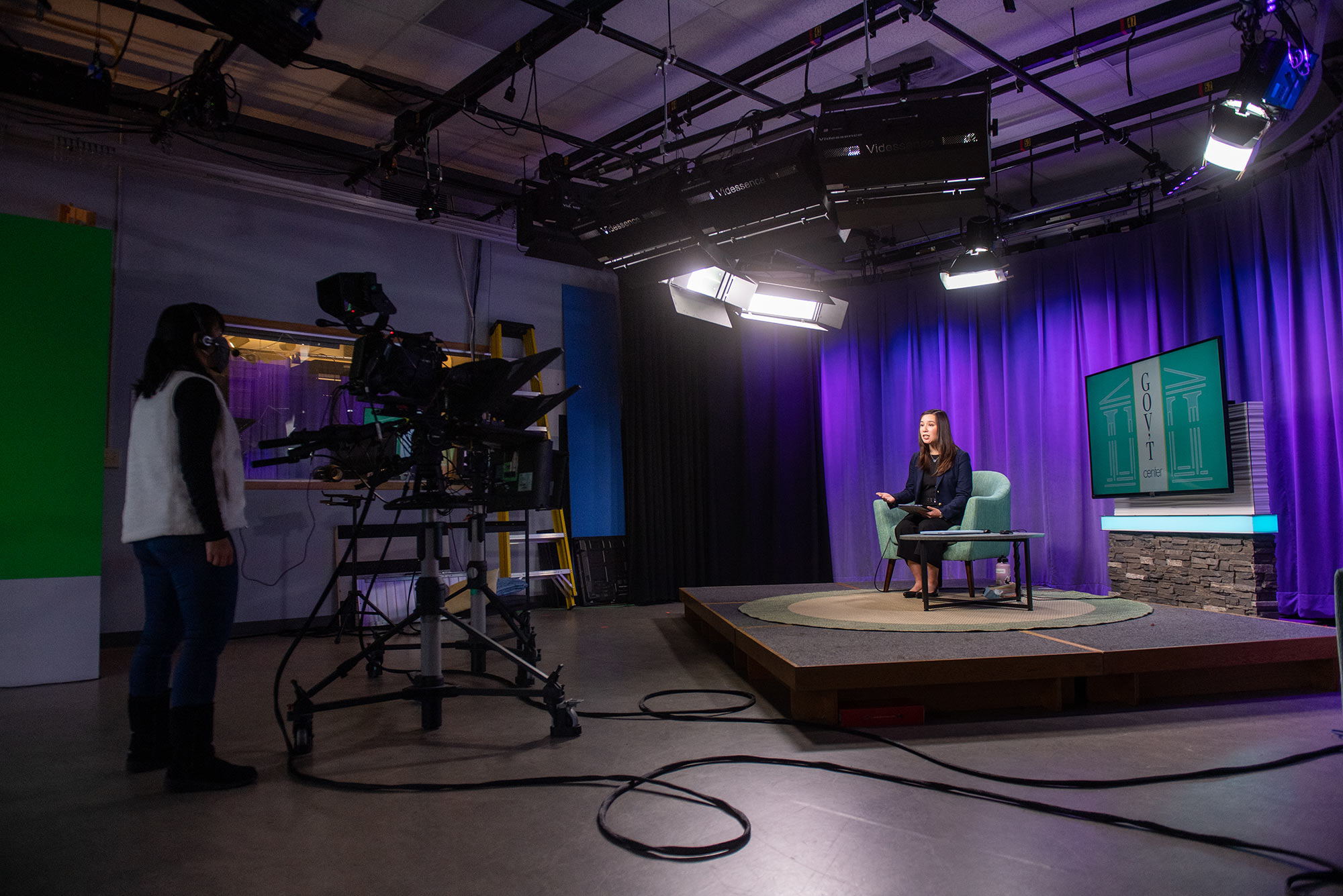BUTV10 Continues to Create Content While Sticking to Strict Health Protocols

Gov’t Center anchor Haley Chi-Sing (COM’22) interviewing US Senate candidate Kevin O’Connor for a segment, with producer Mia Cathell (COM’21) running the camera.
BUTV10 Continues to Create Content While Sticking to Strict Health Protocols
With shows like Gov’t Center and Shadows, learning to adapt to new social distancing guidelines in the studio
Campus life looks quite different this semester and productions at BUTV10, Boston University’s student-run television station, are no exception. Although strict social distancing guidelines have restricted the number of cast and crew allowed in the College of Communication studios at one time, many in charge of the station’s programs have found work-arounds to continue producing content.
“Where there’s a will, there’s a way,” says BUTV10 faculty advisor Christophor Cavalieri (COM’81), a COM assistant professor of television. “What BUTV10 is doing in a production environment is quite similar to the same process that we’re going through in our everyday lives. We have to just adjust to what these new norms are. What we’ve seen in the first month is that the students have adjusted pretty well.”
The COM faculty has been working since the end of spring semester to reincorporate students into the studio while adhering to health measures put in place by the University, COM, and the film and television department, Cavalieri says.
These measures include limiting the number of students in the studio to eight at a time, maintaining a distance of at least six feet between them, and wearing masks at all times unless on camera during a shoot. Station general manager Malaika Moyer (COM’21) says thanks go to the technical engineers at COM—Marissa Dianas (COM’19), Jake Kassen (CGS’01, COM’03), and Tristan Olly—whose role has been invaluable in helping production continue by figuring out how to rearrange the studio’s equipment to allow for better social distancing and creating a Zoom guide for how to conduct interviews and include shots from calls into the shows.
With fewer students permitted in the studio, producers have had to find alternative ways to involve as many people as possible. Moyer says that many shows will rotate crew members throughout a shoot.
Good Morning BU producer Lexi Matthews (COM’22) says the production team now performs far more tasks remotely. For instance, rather than meet in a COM classroom on a Thursday night to assemble and edit video packages for a show the next day, students now perform these tasks throughout the entire week and coordinate virtually. “A lot of work for Good Morning BU this semester has been trying to figure out how to incorporate as many people as possible while still staying as safe as possible,” Matthews says.
Virtual work also presents additional opportunities for students to observe postproduction and editing processes, whereas this previously involved only editors and producers, according to Cavalieri. “BUTV10 is fundamentally about teaching students to create content,” he says. “The more students we can get to participate in every level of the process, the better off it is for the students and the better off it is for the organization.”

Yet virtual production can’t replace shooting in the studio, where students learn skills like simultaneously operating the teleprompter and the audio, or directing a live production. “It’s learning a new language,” says Gov’t Center producer Elias Miller (COM’21, CAS’21). “You just have to learn how to multitask.”
Gov’t Center anchor Chloe Liu (COM’23) adds that it felt different when she interviewed Boston mayoral candidates Andrea Campbell and Michelle Wu on air earlier this month over Zoom rather than in person. “Being able to see them was obviously nice,” Liu says, “but not being able to talk to them in person definitely takes away from an interview.”
While the set layout on news shows makes shooting in person doable, the University’s protocols presented some unique barriers for the station’s scripted shows. Until recently, the plan was for Shadows to shoot in person in student apartments. But after the uptick in COVID-19 cases in Boston and on campus, the plot of the sci-fi show was adjusted to center around a Zoom call, with coproducers Alison Wright (COM’21) and Raquel Tadeo (COM’21) directing the actors over the phone.
“Honestly, it’s changed everything that we do, but I think we’ve adapted really well to it,” says Wright.
When it comes to the actual production, she says, other students involved in the show have been able to contribute remotely. Wright, who is home in New Mexico and participating in Learn from Anywhere (LfA) this semester, is helping with the show’s casting, attending weekly preproduction meetings, and assisting with editing postproduction, all over Zoom.
“In terms of our crew who are working remotely, the only thing that has really changed is the lack of ability to be on set and actually work with the lights and camera,” she says.
“We’ve kind of carried on as we normally have,” adds Tadeo.
Despite having to adjust to a radically different set of rules, producers say that they are proud of what they have accomplished so far this semester.
“I would say that it’s certainly a story to tell to our kids and our grandkids—that we’ve adapted and evolved through this unprecedented time,” adds Mia Cathell (COM’22), another Gov’t Center producer.
Moyer shares that opinion, as well. “A lot of the time, we just don’t know what a show will look like until it’s done,” she says. “But it’s worked out. We’ve been able to do it, and I’m really proud of what all of our producers have been able to accomplish.”
Comments & Discussion
Boston University moderates comments to facilitate an informed, substantive, civil conversation. Abusive, profane, self-promotional, misleading, incoherent or off-topic comments will be rejected. Moderators are staffed during regular business hours (EST) and can only accept comments written in English. Statistics or facts must include a citation or a link to the citation.